Podcast: Play in new window | Download (Duration: 40:18 — 46.5MB)
Subscribe: Apple Podcasts | Spotify | | More
This is going to help you because I’m going to pull the curtain back and walk you through why I changed the name and strategy of the podcast not that long ago…and why I’m now changing it again. First, let me tell you about my experience in completely changing – and I mean COMPLETELY CHANGING – my business.
Context provides understanding.
My context goes back to my entry into retailing. Specifically, consumer electronics retail. I walked into a local hi-fi store when I was in high school and asked for a sales job. I had no sales experience, but I loved the stereo gear because I loved music.
With no experience, but a lot of enthusiasm I got a job selling stereo equipment for straight commission. That meant I got no pay unless I sold something (illegal today, but this was the mid-70’s). I loved retailing, stereo gear, music, observing human behavior and performance-based pay (not necessarily in that order). 😉
By the time I was 25 I was leading a multi-million dollar company. By the time I was 50 I had almost 35 years of experience selling, merchandising, advertising, managing, leading and operating. It was time to pass on what experience had taught me. And to lean more into my passions of being a good operator and leader.
As a lifelong learner (and reader), I had been consumed with leadership, management, human behavior, psychology, consumer behavior, marketing and sales for as long as I could remember. I was still in high school when I first read of W. Edwards Deming, the man General Douglas MacArthur brought to Japan in 1951 to help with the census following World War II. Deming was a brilliant engineer and is largely responsible for helping Japan become the world power in manufacturing long before Korea and China came to power.
If you can’t describe what you are doing as a process, you don’t know what you’re doing.
It is not necessary to change. Survival is not mandatory.
It is not enough to do your best; you must know what to do, and then do your best.
I was obsessed with improvement. My own and the companies I ran.
Books have always surrounded me. Business books. Self-help (now called Personal Development) books. Psychology or human behavior books. Marketing books. Sales books. Leadership books.
I’ve invested gobs of money in books, but I’ve invested even more time in reading them.
I’ve invested far more than Malcolm Gladwell’s proverbial 10,000 hours to watching human behavior, especially consumer behavior. And I’ve invested 7-8 times that many hours practicing the craft.
Trying things. Experimenting. Working hard to figure things out.
I didn’t always succeed. I failed plenty.
The failures were all me. The successes mostly the result of having good, sometimes great people, around me. But I figured a few things out along the way. Mostly, I figured myself out.
By the time I left the C-suite I was ready to do more significant work. Work that would be legacy work. I found myself using the phrase “passing it on” far too often. And I was slowly, but surely leaning more and more into who I really am – a communicator who thrives in helping people figure things out.
I’d long know I was different in many respects. Growing up I was envious of people who weren’t plagued with what I saw as a big burden. I was a noticer. Small details were inescapable. Subtle human behaviors stood out like a sore thumb for me. Things others didn’t seem to notice leapt out at me, refusing to be ignored. I could sense things with alarming accuracy. Simply by watching people’s facial expressions, body language, and vocal tone. It was ridiculously annoying growing up.
Empathy was a natural gift. Words, too. Compassion was easy and necessary. That simply meant my empathy drove compassion which is the fuel for doing something to help. To serve.
Sure, along the way I suffered being taken advantage of some. I suffered being disappointed in people and their foolish choices. But at every turn, I was naturally wired to figure out why they did what they did. To understand them.
According to the Myers-Briggs survey, I’m an INFJ, which basically means I’m introverted, highly intuitive, emotionally driven and discerning (judging). I appear like an extrovert much of the time, but I’m fueled by going deep with people – as deeply as they’re willing to go. INFJ personality types are often called COUNSELORS because there is something we emit – some signal or something others pick up – that lets them know we’re anxious to help. So people tend to easily lean on us for assistance. And speaking only for myself, I love it. I love being that guy.
Mostly, I love that people feel safe with me. And that people trust me. Keeping secrets isn’t hard for me. Forgiveness is easy. Bitterness is hard.
Now before you start thinking I’m all that and then some, I’ve got some serious flaws. For starters, I think I can help anybody in any situation. That’s ridiculous and I know (logically) it’s not true, but I still believe it and will die trying to help. I’m also an over communicator, which can drive family nuts I know. I enjoy understanding, which means I ask questions (lots of questions). I enjoy conveying what I’m feeling (but only to those with whom I feel the safest). And that necessarily means, at least for me, that it’s an extremely small number of people who really know me. Not because I’m unwilling to share or because I’m unwilling to be vulnerable, but because I’m unwilling to impose, which is how it feels.
It’s been long said of INFJ personality types that we counsel others, but find it hard to accept help ourselves. And that’s truer than you may know. Accepting help is very difficult because it’s a role reversal I’m not used to.
When I left leading multi-million dollar companies I set about to help business owners and leaders tackle their problems. I was a lifelong operator. An expert in human behavior. A guy with mad dog people skills – those soft skills. But I had no experience in “professional services” like executive or CEO coaching.
For the past 10 years or so I’ve experienced success and failure along the way diving deeply into the problems of CEOs and top-level leaders. What began as “roll up your sleeves, get your hands dirty” consulting morphed more into coaching. I hated consulting. I loved coaching.
Consulting is “I’ll do it for you.”
Coaching is “Here, let’s help you figure out how to do it yourself.”
True confession – there was something I absolutely hated. With a passion.
Getting clients.
Not because I hated selling or because I wasn’t very good at it. Quite the contrary.
It was because I was selling ME. It was way too personal. It felt way too nasty. Too much self-promotion (something that is insanely difficult for me). In a world filled with thought-leaders I found myself saying to people (quite seriously, I might add), “I’m struggling to lead my own thoughts so I’m in no position to lead yours.” Yes, it was slightly tongue-in-cheek, but it was more real than people understood. I meant it. I still mean it.
Along the way, I rubbed shoulders with authors, speakers, experts and self-proclaimed “thought leaders.” Sometimes I envied them. Mostly I didn’t feel at home around them. They just weren’t “my people.”
I was trying to learn from them – trying hard to figure out what the most successful among them had figured out. Namely, how to grow and build a successful enterprise so more people could be served. At at every turn it was growing increasingly more obvious, it wasn’t my natural wiring to promote the way I needed to. To exude the confidence and bravado that the world pays attention to – and that the world positively responds to.
Simultaneously I was finding success just being true to who I was. I’ve landed as many clients as not by sitting down with them in the first meeting, listening to what they most want to accomplish and figuring out that I’m not likely the best option for them – and telling them so.
“I’m probably not the best option to address the specifics of what you seem to want,” I’ll say. And I’ll even go on, “I’m not using a ploy to get you to want to hire me. I genuinely think you may find somebody with experience in your space who can better serve you.”
They’ll often look at me and I know the look. It’s the look, “I want to hire YOU.” It makes me feel good but puts tremendous pressure for me to over-deliver (something I’m naturally wired to do anyway). I take every engagement very personally and give it my all. It’s the only way I know to operate. I get fully invested in the people I serve.
Which is great.
Until the engagement ends. And then I’m wrecked for a period of time because it feels like the loss of a close relationship. People who have shared their deepest, darkest fears and challenges. People who found me safe. People who trusted me completely. Then we say good-bye after 6 months. Or three years.
I maintain contact with at least 80% of everybody I’ve ever served. It may be a random text message, “Just checking in on you. Hope all is well.” Or it may be a lunch where we break bread together and catch up. I don’t know any other way to be.
Four years ago I was given an epiphany. I’m being big and bold calling it an “epiphany.” It was more like a moment of enlightenment. I became aware of something I didn’t know about. Not fully.
Peer advisory groups. Professional peer advisory groups.
It instantly made sense to me. Join yourself to others who share one big thing in common – in this sense, everybody is an entrepreneur or CEO. No matter that everybody is running a company that may be very different from the others in the group. The common denominator is running a business. That provides instant understanding. Everybody knows what it is to meet payroll, generate revenues, handle HR issues, serve customers and all the other things involved in operating a profitable business.
The power is in the difference though. The various experiences and insights that each person brings to the table provide more perspectives than anybody could have alone.
One evening in this journey had me thinking about typical (if there is such a thing) support groups. That led me to one particular group – The National Organization of Parents Of Murdered Children, Inc.
I’ve seen enough shows on the ID channel to have some understanding of the searing pain parents suffer at such dreadful news. But I can’t possibly understand it. Not really. Because it hasn’t happened to me. I instantly thought, “What better place could there be for parents in that situation?” I mean, you walk into a meeting, introduce yourself and that’s all that’s required. Everybody in the room is just like you. They know your pain. It’s an instant bond and trust.
But…
The power is in the differences. Some are further up the trail in having dealt with their pain. Some are wired very differently than you. Everybody is coming from their own unique experience and place in life. Yet, they all know the pain of losing a child to murder.
A single tie binds them. The differences are where the power is to get through it.
It made sense to me. Truth is, it has made sense to anybody who will listen to it. It universally makes sense.
That led to leveraging some information made more clearly known to me by a book, The Knowing-Doing Gap by Jeffrey Pfeffer and Robert I. Sutton (2000). The book focuses on companies closing the gap between what they know and what they do. The authors argue that quite often we know enough. We just don’t do enough. It’s equally true of individuals.
You likely already know enough. You’re not likely doing everything you already know to do.
As I dove more deeply into the whole peer advisory advantage – people surrounding themselves with others who are like them in some way (for me it was either everybody is a CEO or business owner) – I knew it was work I was meant to do. How to make the transition wasn’t something I understood. Yet.
“Everything is hard until it’s easy.”
We each hold personal truths. They’re not empirical truths. In other words, they form our reality, but they may not all be real. We just think they are. And we behave as though they are. These personal truths drive our behavior. Empirical truths don’t.
Mostly we chase more information. I’m not prone to data overload. I don’t go seeking more information before reaching a conclusion. Yet I lean heavily toward evidence because my intuition is so high I want to do my best to make sure I’m seeing it as it really is. If the decision is important (which just means the stakes are higher), then I look for more evidence that I’m seeing things correctly. If the stakes are low (which just means the stakes aren’t high at all), then I’m comfortable and confident leaning more on my intuition.
I’d been coaching individual people or small groups. The work had been personal, intimate and always within the context of their challenges, opportunities, and experiences. In every case, there was also another important element – internal politics. In some engagements, the politics were so enormous they impacted every decision made by individuals or the teams. In every engagement, the coaching sessions had to take into account politics. It’s just how the work went.
I had not analyzed this. I just accepted it.
Working to get myself up to speed on peer advisory groups was opening my eyes to some existing things that weren’t working for me personally. I was growing increasingly unhappy because I was having to regulate myself more and more. And I didn’t like it.
For example, candid conversations are easy for me. I relish them. They work. Beating around the proverbial bush, talking in riddles, making clear things mysterious is a surefire recipe for poor performance, unhappy and disengaged people. But I’d often find myself surrounded by that kind of behavior. In some cases leaders were quite committed to that effort, wanting me to “change” their people when in reality THEY were the problem.
I lost myself somewhere along the way.
Never one to sell out, every engagement took a large part of who I am and eroded it. Some much more than others. Sitting down with people helping them gave me energy. Dealing the politics knowing they were in a circumstance where so many other things beyond performance had to be considered — sucked the life right out of me.
By the time I reached out to Leo Bottary who had co-authored the book, Power of Peers: How the Company You Keep Drives Leadership, Growth, and Success – I knew I was due to major change. I didn’t yet know how or what that meant.
Leo and I became fast friends and I began to learn. And learn some more. And learn some more.
Along the way, I decided it was time to push all my chips into the middle of the table and bet the farm on becoming a leader of peer groups. That prompted the birth of an idea, The Peer Advantage.
Twice – that’s right, TWICE – I’ve made a shift in this podcast by renaming it The Peer Advantage podcast. Thought was, become the podcast with that focus. The first time I did it without much thought. The second time I did it with lots of forethought. That was recently, within the last few months.
It was a mistake both times. I wasn’t doing what I knew to do. Instead, I began to do what I knew I likely shouldn’t do, but I was desperate to make this shift or change in my life’s work.
“What do you want to be known for?” I had asked myself. Not in some vanity sense, but in a marketing or business sense. My answer was, “I want to run at least two online peer groups serving business leaders.” The answer was far less focused on identity as it was on what I most wanted to DO. Truth was, I simply didn’t want to be restricted to worry about helping navigate the politics inside their organizations. Instead, I wanted to help top-level leaders – the ones mostly responsible for the politics (and culture) – to forge ahead in building, growing and sustaining a high performing organization. The only way to do that is to help the person at the top.
That insight is important because it make the change of this podcast to The Peer Advantage even more idiotic. Bad move. Failure. Why? Quite simply because more than 99% of top-level leaders have any experience with professional peer advisory groups. Almost nobody has experienced them. Almost nobody understands the true value of being surrounded by other CEOs or entrepreneurs. And many others, who still don’t understand them, think they’re something they’re not. Some think they’re networking groups where entrepreneur exchange business. Some sort of “you-scratch-my-back-and-I’ll-scratch-yours” deal. Some think they’re “good ‘ol boys” clubs where people get together to just shoot the breeze. Almost nobody I’ve encountered in the last few years to engage in conversations about the power of peers understand it in a professional context.
I’m empathetic about all this, but it was puzzling because almost everybody gets the power of peers when it comes to kids. We all seem to fully understand the impact our friends had on us when we were young. And those of us who are parents or grandparents understand how important it is that our kids run with the right group. We care about who our kids choose as friends.
We don’t seem to understand how that same exact power is present in our lives as adults. That’s important because it’s what drove me to make the change in this podcast, a change that I repeat – was a failure and the wrong move. I knew what to do, but instead of doing it…I did something different. I didn’t’ think clearly. And I got impatient. That’s a big part of my failure.
I reached out to a couple of podcasting buddies who have vast knowledge of this medium and how it all works. Not just from a technical viewpoint, but from a marketing and building an audience standpoint. One responded right away, but the other one didn’t respond at all. I thought nothing of it. Rather than move forward with my plan to have these guys question me, challenge me and help me figure this out – I just dove in to do what I felt I should do. I made the change and immediately felt like it wasn’t right. But I leaned into it anyway. I’m not afraid to try something, but I wanted to get it right. I failed.
Some weeks went by and I heard from the buddy who hadn’t responded. He was up for the challenge. But by then I was multiple episodes into the change. Too late. I hadn’t given enough breath to the process. Instead, I had dug in and made a move that likely could have been prevented – a failure that I could have avoided if I would have relied on these two trusted friends. Friends who understand me, podcasting and my context. But I ignored it. Trudged forward even though at some level I know what to do, and they could have helped me.
The emperor has no clothes.
Here I was embarking on making major shifts in my business and this podcast. Aiming to help people learn how to leverage the power of others. And I was forced to face the reality that I wasn’t doing the very thing I was preaching. I was completely hypocritical. Trying to go it alone when I had two buddies willing to help me.
The lesson for you is no different. We’re driven to do things. Make things happen. Patience isn’t likely our strong suit. We’re driven to get things done. Accomplish something.
I could have avoided confusion, failure and feeling crappy about myself if I had leveraged the power of others. These guys were willing to serve me simply because I had asked. That’s the kind of guys they are. It’s the kind of relationship we have. I’ll go you one better — I told them both that I’d like to record it because I felt the conversation might benefit other podcasters fretting about changing their business or their podcast. It was a good idea. A really good idea. But I blew it. Ripped it to shreds without much thought because I got antsy.
After some weeks of thinking, “I shouldn’t have done this” I just stopped. One day I got up and decided I’m going back to Grow Great. Classic case of neglecting to do what I knew I should and an even more classic case of making a decision without the insights of others fully capable and willing to help me. Guilty of preaching one message and doing something completely contrary to it. #DOH
There are likely so many things in your life as a leader that you already know to do, but you’re not doing them. Let me encourage you to get in touch with those things. Sit down and think more soberly about what those things are.
Here are some things that might help.
- Write down the top 3 things that are putting pressure on you today. Put them in order of importance.
- Focus on the top one. Is there one thing you feel very confident about doing with regard to that one issue — but you’re not doing it? It doesn’t matter if it’s big or small. Just one thing that you’re thinking you should do. It would be something as innocuous as calling a meeting to discuss it with people who could likely influence a better decision. It would be something more concrete like an important decision to take some action. Narrow your attention on the one thing you could do next.
- Do that one thing. Call that meeting. Make that decision. Do whatever it is that might move you forward.
- Measure the impact. How did it work out? Does it feel right? Is it working out favorably? Get a grip on whether it’s working or not. Does it need more time?
- Get feedback from people who can help. This is important – and something I neglected to do. I skipped this step. Truth is I skipped many of these steps and created confusion and chaos that could have been avoided. But I got impatient and stupid. Huddle with people who can provide valuable insight so you better understand the adjustments you should make.
- Take action based on whatever commitment you made to yourself based on the feedback.
- Lean on the people who provided the feedback to help you become or remain accountable for what you decided. You owe it to yourself. It’s less about what you owe the people who helped you. You owe it to your own forward progress and success.
- Keep doing this so you develop better habits of focusing on the important things – those critical decisions you must make – and on leaning on others to help you do it better. Exercise these steps on those number 2 and number 3 things on your list of things that are putting pressure on you today. Don’t neglect them, but don’t commingle them with the top priority. It doesn’t mean you can’t tackle three things at once (you do that all the time and it’s often necessary). Do each item as you need to. They may or may not influence each other. That’s for you to decide.
You WILL figure it out. Others can help accelerate that. And make it more effective and impactful. Stop behaving like a hermit with all the answers. Save yourself the time, embarrassment and failure that can often accompany stubbornness.
I’ve made a commitment. To myself.
I’m going to lean on people I trust. Period.
It’s at the heart of the work I most want to do. Work that I think provides some of the highest value the planet has ever known – the power of others!
Be well. Do good. Grow great!
Randy
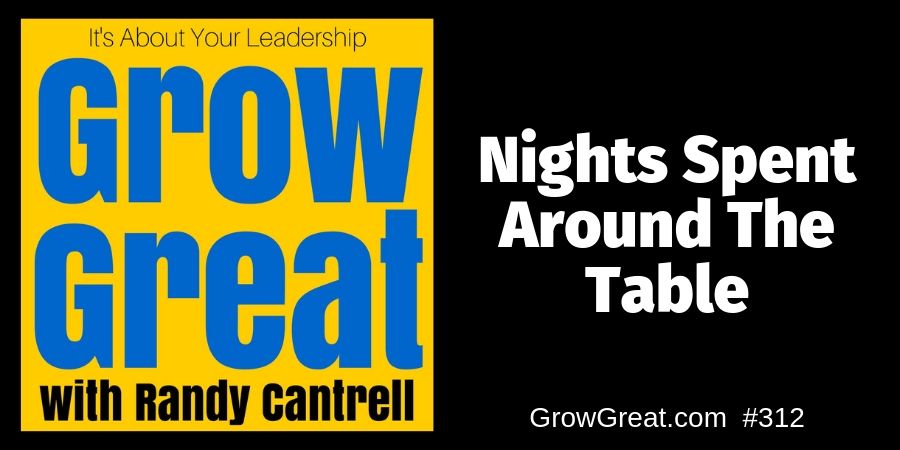
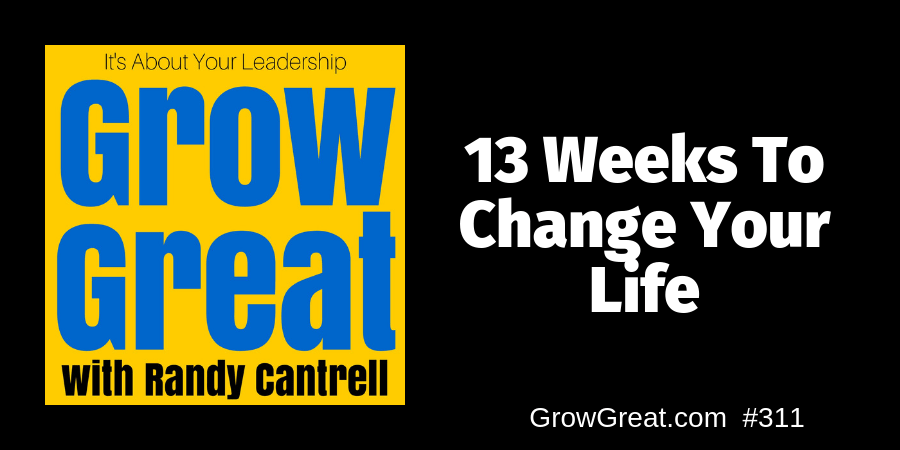
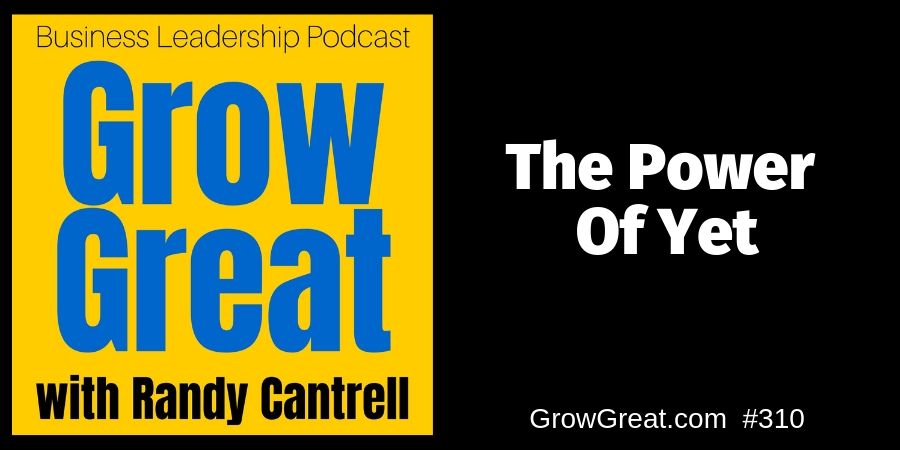
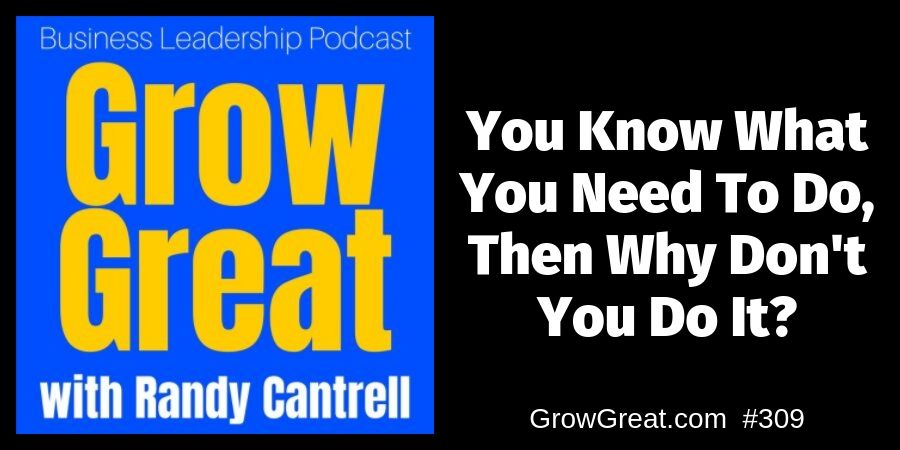
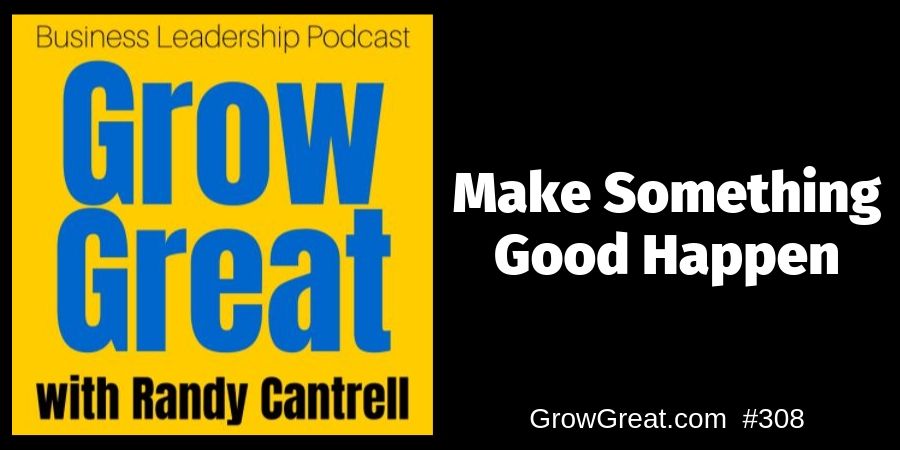
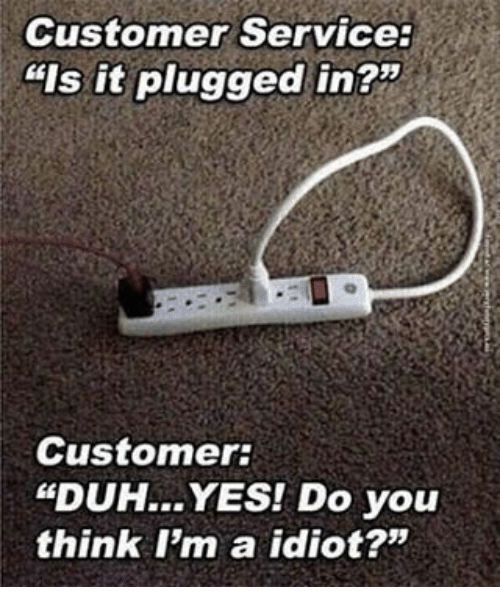
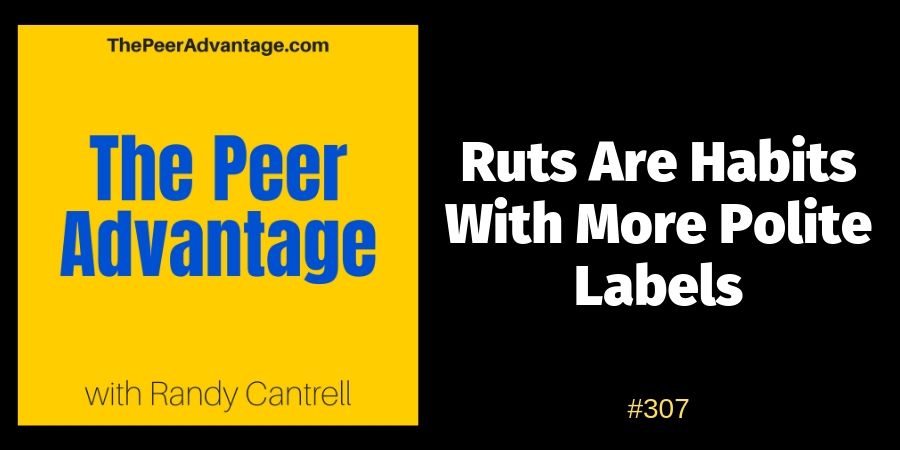
 Getting your vehicle stuck in a rut ain’t fun. And it can be difficult to get yourself out. Which is why sometimes we have to get somebody to pull or tow us out of a rut.
Getting your vehicle stuck in a rut ain’t fun. And it can be difficult to get yourself out. Which is why sometimes we have to get somebody to pull or tow us out of a rut.